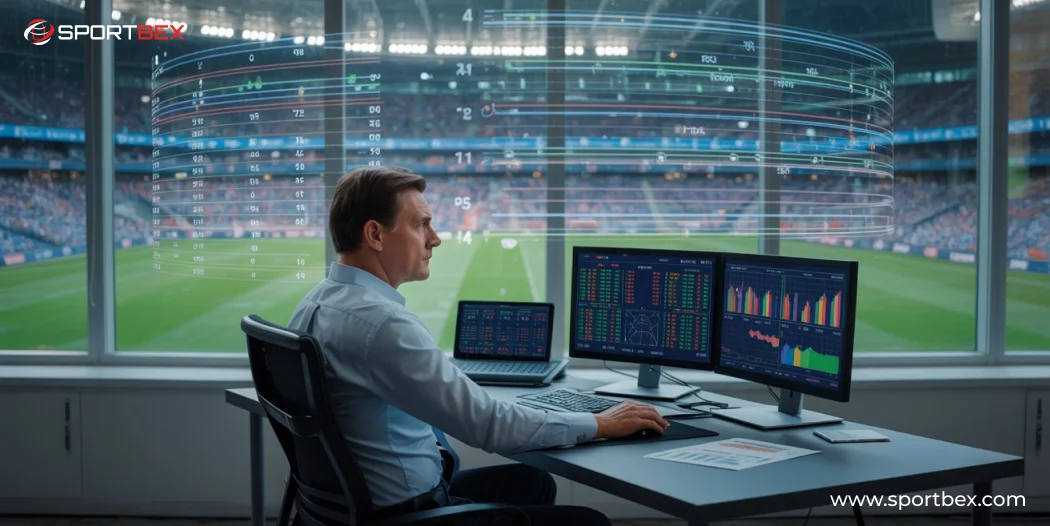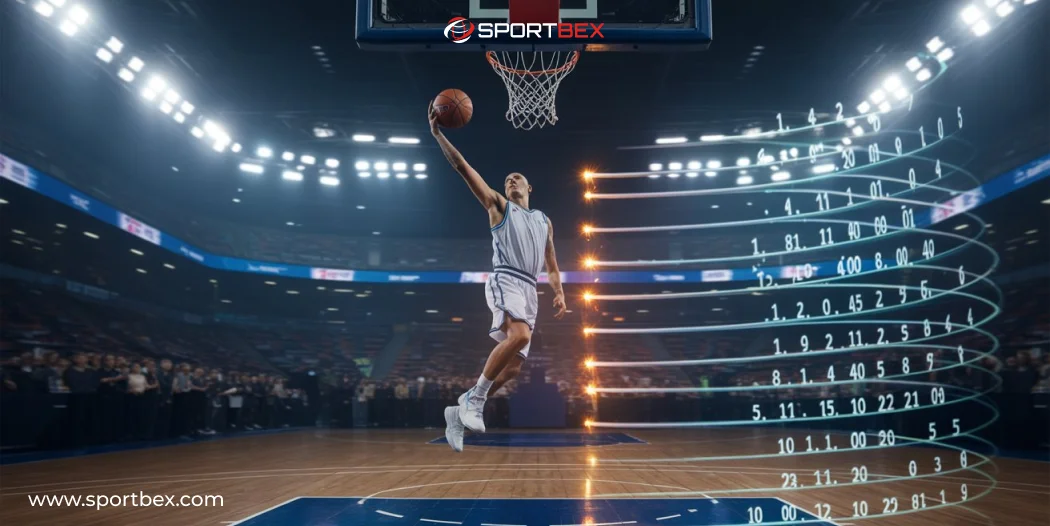In the world of sports betting, every number you see on the screen has a meaning. These numbers, known as Sports Betting Odds, aren’t just random figures.
They’re carefully calculated by experts called oddsmakers or bookmakers, who study team data, player stats, and betting trends to make sure the odds are fair for players and profitable for the sportsbook.
Whether you’re someone who places an occasional bet or runs a betting platform, it’s helpful to understand how bookies odds are set. Sports Betting Odds don’t only show who’s likely to win; they also reveal how confident the bookmaker is about each possible result.
In this blog, we’ll break down what sport bet odds actually mean, why do odds keep changing, and how bookies manage to stay profitable no matter what happens in a game.
We’ll also touch on how modern bookmakers use data, technology, and even tools like a Sports Betting API to stay competitive in today’s fast-changing betting market.
What Are Sports Betting Odds?
Sports Betting Odds are the base of every bet you place. They tell you two simple things: how likely an event is to happen and how much money you could win if your prediction is correct.
For example, if a football team has odds of 2.00, it means the bookmaker believes they have a 50% chance of winning. So, if you bet $10 and the team wins, you’ll get $20 back.
In short, Sports Betting Odds represent probability. The higher the odds, the less likely the outcome; the lower the odds, the more likely it is to happen.
There are three main types of bookmaker odds used around the world:
- Decimal odds (popular in Europe)
- Fractional odds (common in the UK)
- American odds (mainly used in the US)
No matter which format is used, all types of odds serve the same goal to show potential payouts and keep betting balanced on both sides.
Today’s odds makers use a combination of historical data, statistics, and advanced algorithms to calculate odds with accuracy. Thanks to technology, many sportsbooks set odds automatically using real-time systems, ensuring that updates happen quickly and odds stay fair for everyone involved.
Why Do Sports Betting Odds Change?
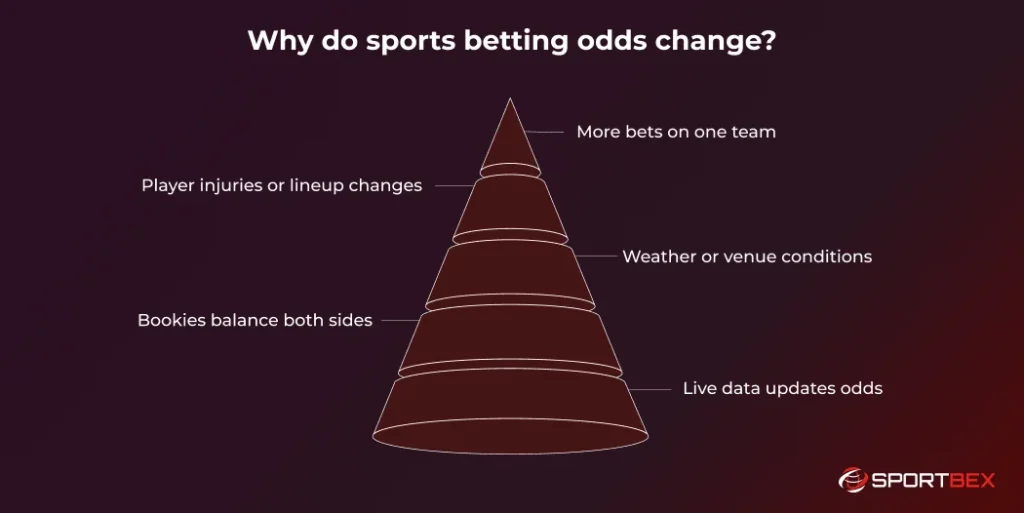
If you’ve ever checked a sportsbook before a match, you’ve likely seen Sports Betting Odds shift within minutes. This doesn’t happen by mistake. It’s because several factors can influence how sports betting odds are set and updated. Let’s look at the main reasons why they change.
More Bets on One Team
When too many people bet on one team or player, bookmakers quickly react. To avoid losing too much money if that team wins, they lower the odds for that side and increase them for the other. This helps keep the betting balanced on both sides.
For example, if most bettors choose Team A, the bookie might change their odds from 2.00 to 1.75. This makes Team A a less tempting choice and encourages people to bet on Team B instead. It’s a smart way for bookies to balance the action and manage their risk.
Player Injuries or Lineup Changes
When a key player gets injured or is suddenly removed from the lineup, it can completely change a team’s chances of winning. Bookmakers quickly adjust their bookies odds to reflect the new situation.
For example, if a top striker or main bowler is ruled out, the team’s odds of winning will increase because their chances drop. These changes can happen just hours or even minutes before the game starts, as sport bet odds react in real time to new information.
Weather or Venue Conditions
Weather can strongly affect how a game is played, especially in outdoor sports like football, cricket, or tennis. Rain, strong wind, or extreme heat can change team strategies and overall performance.
Bookmakers take these conditions into account when updating sport bet odds so they reflect the most realistic outcome. Venue changes, like moving a game to a neutral stadium, can also shift the Sports Betting Odds and influence how both teams perform.
Bookies Balance Both Sides
A bookmaker’s main goal isn’t to predict the winner but to keep the betting money balanced on both sides. When too much money is placed on one team, they adjust the bookmaker odds to attract bets on the other.
This method helps reduce the bookmaker’s risk and ensures they make a steady profit regardless of which team wins. It’s a simple but effective way to manage Betting Odds and stay profitable in a constantly changing market.
Live Data Updates Odds
During live matches, odds can change every few seconds. This happens because sportsbooks set odds using live data such as player performance, possession, and scores.
Technology plays a major role here. Many modern platforms use tools like a Sports Odds API or a Live Odds API to automatically update odds in real time. This keeps the betting experience accurate, engaging, and fair for bettors while helping bookmakers protect their profit margins.
How Do Bookies Set Sports Betting Odds?
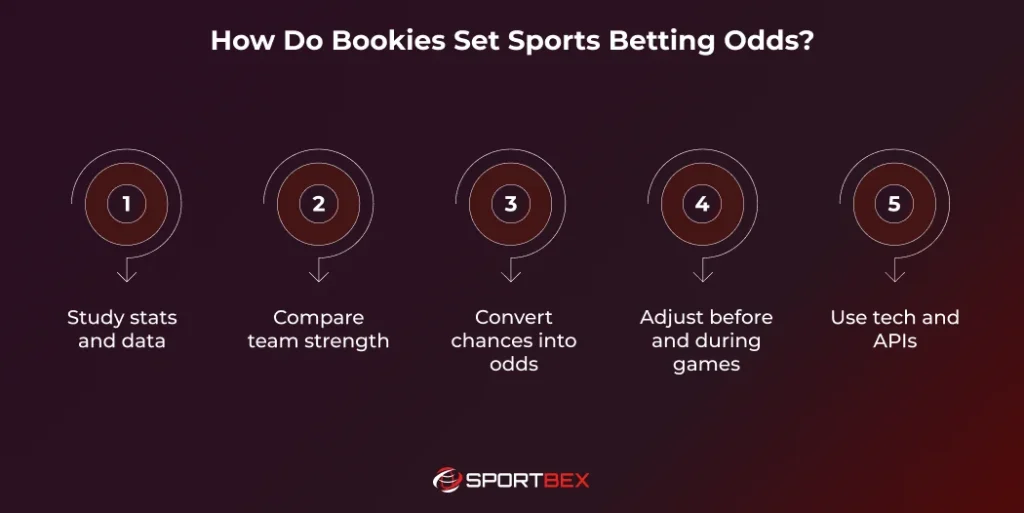
Now that you know why do odds change, let’s see how do bookies set odds in the first place. It’s not just guessing, it’s a mix of data, research, and experience. Bookmakers use numbers, statistics, and real-world knowledge to make sure their odds are fair for players and profitable for the house.
Study Stats and Data
Before releasing odds, oddsmakers study every possible piece of information. They look at player form, team performance, injury news, and even weather forecasts. They also analyze how teams have performed in similar conditions before.
This helps them estimate the chances of each possible outcome. For example, if a team has won most of its recent home games, bookmakers will likely offer shorter Sports Betting Odds on them winning again.
Compare Team Strength
Bookmakers carefully compare both sides of the matchup to find a fair balance. They look at attacking power, defensive ability, recent results, and motivation. Factors like rivalries or tournament importance also make a difference.
By weighing all these details, bookies create a realistic picture of each team’s strength before turning that data into bookmaker odds that reflect the true balance of the game.
Convert Chances into Odds
Once the probabilities are calculated, they’re converted into odds. For instance, if a bookmaker believes a team has a 60% chance of winning, the odds would be around 1.67.
At this point, bookies also add a small margin to protect their profit. This margin ensures they make money over time, even when results don’t go exactly as expected.
Adjust Before and During Games
Odds are constantly updated before and during matches. As new information comes in, such as a goal, an injury, or a sudden shift in performance, bookies odds change right away.
This flexibility helps bookmakers manage risk and keep their odds accurate. It also gives bettors a fair and updated view of what’s happening in real time.
Use Tech and APIs
Modern bookmaking relies heavily on technology. Automated systems powered by Sportsbook API Integration or White Label Sportsbook solutions help bookmakers manage thousands of markets at once.
These systems update odds automatically, track betting patterns, and alert traders when major shifts occur. Technology ensures accuracy, speed, and consistency, which are key elements for every successful bookmaker.
How Bookies Stay Profitable When Odds Change
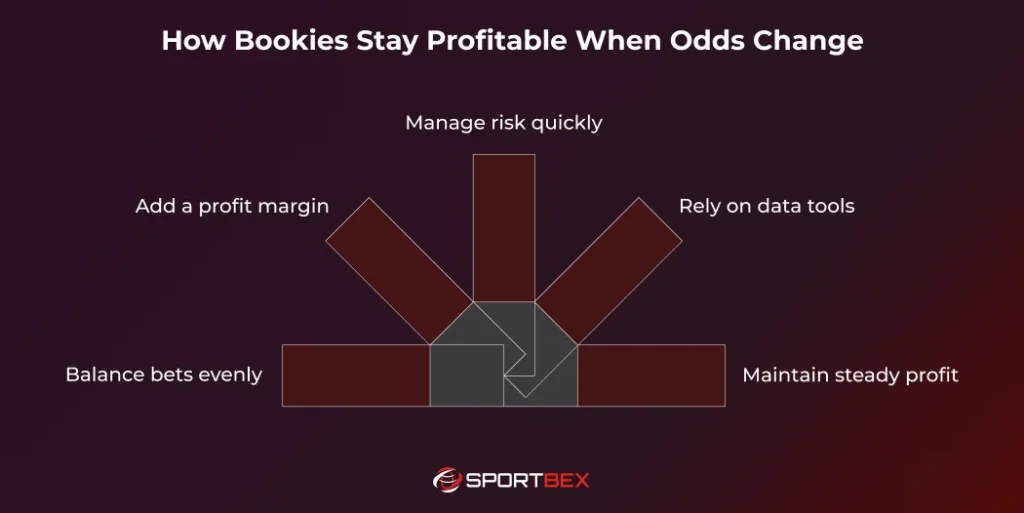
Balance Bets Evenly
Bookmakers try to keep the total money bet on both sides of a match as even as possible. When they achieve this balance, the money lost on one side helps pay out the winnings on the other. The small amount left over, known as the margin, becomes the bookmaker’s profit.
This balance betting is one of the main reasons odds change. If too many bets go on one team, the bookmaker adjusts the odds to make the other side more attractive. It’s a smart way to protect their profits and manage risk.
Add a Profit Margin
Every betting odd includes a small built-in profit called the margin or “overround.” This margin ensures that the bookmaker makes money regardless of the outcome.
For example, if fair odds equal 100% probability, bookmakers might set theirs at 105%. That extra 5% becomes their guaranteed profit. It may seem small, but across thousands of bets, it adds up to a steady and reliable income.
Manage Risk Quickly
Bookies don’t just set odds once and leave them. They constantly monitor betting activity in real time. If too much money goes on one outcome, they act fast by adjusting the odds or limiting large bets.
This quick reaction helps them control risk and avoid major losses when results don’t go as expected. Being able to adapt instantly keeps bookmakers ahead in such a fast-moving market.
Rely on Data Tools
Modern bookmakers depend heavily on data and analytics. These tools help them track betting patterns, analyze player stats, and identify unusual activity that could increase risk.
By combining smart data tools with their experience, bookies can predict market movements and make accurate adjustments. This balance of technology and human insight keeps them competitive and profitable.
Maintain Steady Profit
Bookies don’t win every single bet, and they don’t have to. Their goal is to make small, steady profits across thousands of wagers. By keeping the markets balanced, managing risk, and using reliable data, they ensure consistent returns over time.
Some betting operators even use Betting Platforms to automate odds management and track profits across different sports. This helps them stay efficient, accurate, and profitable even when odds constantly change.
Get a Ready-Made Platform On Rent.
Get Started TodayConclusion
At first glance, Sports Betting Odds may seem like just numbers on a screen, but there’s a lot more behind them. Each odd is created using data, logic, and experience.
Bookmakers don’t rely on luck, they use smart strategies, technology, and math to make sure the odds are fair for players and still profitable for their business.
From studying team stats to changing live sports betting odds during live games, odds makers and sportsbooks work hard to keep betting balanced. Whenever the odds move, it’s because something has changed, maybe a player got injured, a team’s form shifted, or more people started betting on one side.
Simply put, bookies make money by being smart, not lucky. They use accurate data, tools, and experience to manage risks and create fair markets for everyone.
So, the next time you see the odds change, remember it’s not random. It’s the result of careful work and smart thinking that keeps both bettors and bookmakers in the game.
Frequently Asked Questions
Sports Betting Odds show how likely an event is to happen and how much you can win if your prediction is correct. They’re set by bookmakers based on data, team performance, and market activity.
Sports Betting Odds change due to factors like player injuries, weather, betting volume, or live match updates. Bookmakers adjust the odds to keep betting balanced and reduce risk.
Bookies analyze team stats, player form, and historical data to calculate probabilities. They then convert those probabilities into Sports Betting Odds, adding a small profit margin to ensure steady returns.
Yes. Understanding how Sports Betting Odds are calculated helps you identify value bets, manage risk, and make smarter betting choices instead of relying only on intuition.
Bookmakers don’t profit from every single bet, but over time they do. By keeping bets balanced and adding a small built-in margin, they ensure steady profits regardless of the outcome.
Recent Blog
How NBA Odds APIs Deliver Real-Time Betting Data for Sportsbooks
February 26, 2026
Tracking Tennis Odds Live Using Real-Time Betting APIs
February 26, 2026
